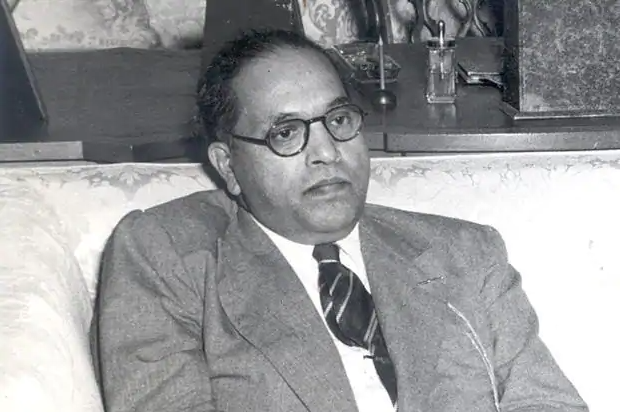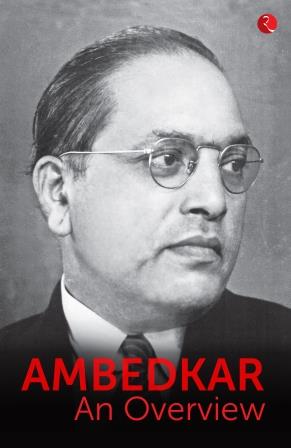Father of the Constitution of India

Over a period of time, Ambedkar had refined his arguments against the caste system. Through his works we can engage in an unbiased appraisal of the societal norms and realize the requirement for its revision. We give ourselves the Constitution. The Indian Constitution that celebrates the fundamental rights of Indian citizens confers individual autonomy as the unit of social action. It promises to protect an individual from the tyranny of the State or society. From a community-based identity the emergence of an individual identity is the lofty promise of the text of the Constitution. A constitution is a grand norm of legislation.
For the average Indian, Dr Bhimrao Ambedkar’s name is etched in history as the prime architect of free India’s Constitution. As the law minister of the Nehru government, he was the chairman of the drafting committee of the Constituent Assembly that framed the Constitution. The chairmanship provided Ambedkar with the opportunity to organize his thoughts and arguments over the crucial concepts of democracy, franchise and fundamental rights. The strength of Indian Constitution lies in its listing of the fundamental rights, which envision the individual as independent of all social encumbrances and stigma. Ambedkar’s passionate engagement with the drafting committee of the Constitution reveals his deep understanding of the tradition of democracy and constitutional law. We too can appreciate in an unbiased manner the need to revisit our societal norms, revise it where necessary in order to pursue a modern path of ensuring justice, equality and liberty.
With unflinching faith in the constitutional democracy, Ambedkar designed his draft for adoption as the Constitution. With profound faith in the people, he could see beyond the tumultuous years preceding the Independence, which were marked by intense socio-political divisions amongst its varied population. As a leading figure of the distressed Untouchable class, he wished that the warring communities could self-reflect and move ahead of their exclusionist politics. He reposes all his confidence in the Constitution which could act as a cushion to absorb all the future tension. Constitutional democracy is being understood as the tool to effect the reorganization of an unequal society. The constitutional framework and its salient features were presented first on 4 November 1948 as ‘Draft Constitution-Discussion’. On being called by the President, Dr Rajendra Prasad, to move the motion as the law minister, Dr Bhimrao Ambedkar introduced the Draft Constitution to the Assembly for consideration.
The principle character that Ambedkar assigns to the draft Constitution is that it is federal in form and unitary in spirit. It envisions a dual polity with the Union at the Centre and the States at the periphery, each endowed with sovereign powers to be exercised in the field assigned to them respectively by the Constitution. The fundamental rights constitute the heart of the Constitution which is justifiable in the court of law. Of all the fundamental rights, ‘Equality of Opportunity’ was closest to Ambedkar’s formulations. While underscoring the necessity of constitutional remedied he proclaimed that fundamental rights are the heart and soul of the Constitution as they would propel the social system towards equality and liberty. Through the Draft, he spelled out the responsibility of the State towards its citizens. The Directive Principle of State Policy in tandem with the fundamental rights is orchestrated to secure social and economic democracy for a society that has historically been full of inequalities and discriminations. He devised a dynamic Constitution which could evolve with the growth of the nation and adapt to the changing needs of the society by keeping abundant provisions for amendments. He was firm on the question of single citizenship, a single judiciary, and uniformity of fundamental laws which would help India to unify as a nation, as it is vulnerable to multiple sources of divisions—be it regions, religions, languages, traditions, and customs. At the same time, he was clear in his assessment through the Draft that without economic and social justice, political independence would not bring about the lofty ideals of national integration.
The Draft Constitution presented by Ambedkar evoked varied responses from the members of the Assembly. In response to the lengthy discussion and debate, he replied with his usual calm and composure in his last address to the Constituent Assembly, ‘Adoption of the Constitution’. It is interesting as well as instructive for us to look back at the content of his speech and realize how prophetic could be a liberal mind. In his own words, his mind was so full of the future of the country. In his last address to the Constituent Assembly on 25 November 1949, Ambedkar expressed his views on the trials and tribulations ahead for a nascent sovereign State.
The speech represented Ambedkar’s concerns for India’s forward journey to the realm of a modern constitutional democracy. He explored all the apprehensions and aspects of the Draft Constitution before being adopted by the Assembly. Today, after all these decades of India’s engagement with democracy, when we look back at the emotive speech delivered by him, we discover how he could foresee many of the issues that contemporary India is grappling with. And, he cleared the air by claiming that the success of a well-thought-out Constitution would depend finally on the organs of the State such as the Legislative, the Executive and the Judiciary. In turn the success of these institutions would depend upon the people and the political parties that they would set up as their instruments to accomplish their wishes and hopes. In the true spirit of a liberal democrat, Ambedkar did not wish to say that the principle of parliamentary democracy was the only ideal form of political democracy. He only asserted that all the principles embodied in the Constitution were the views of the then generation. In a changed time, one may have a relook at it but without sabotaging the essence of it.
Ambedkar’s incisive thought on the future of the Constitution bears a deep commitment to the principle of justice, liberty and equality. For him, fraternity was the elementary condition for equality. Three things he was worried over, if we wished to maintain democracy not just as a form, but also as a substantive fact of our life. He forewarned us to take guard against three situations. Firstly, along with the old divisive forces like caste and creed, many political parties with diverse and opposing views were bound to function within a parliamentary democracy. We should not allow the parties to place creed above the country. Secondly, he reminded us of the caution that the nineteenth-century English liberal thinker John Stuart Mill had voiced—if we are interested to protect our democracy, we should not trust any great man with power and submit our liberties to such a person who could subvert the institutions. Finally, he warned us that political democracy could not last long without social democracy. What did he mean by social democracy? He meant a way of life that would recognize the worth of liberty, equality and fraternity as the foundational principles of life. These three conditions need to work as a triad to form a union and cannot be separated from each other. The resonance of such a precaution accompanying social movement in India around these building blocks of democracy provoke us to read the essential writings and speeches of one of the finest social thinker of modern India, Babasaheb Bhimrao Ambedkar.
The vast expanse of Bhimrao Ambedkar’s writings and speeches is predominantly driven by a feeling of loss of trust. A loss of faith, one may say, from the great struggles that galvanized into the freedom movement. The Constituent Assembly presented him with the scope to organize his worries, hopes and aspirations for a new India.
****

Ambedkar: An Overview is both a handy reference guide and a preamble for those who wish to familiarize themselves with the pioneering works of Babasaheb.
****

